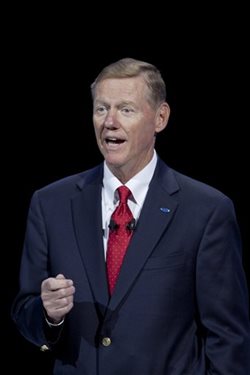When you give people the right incentives, it pushes them toward success.
When you give people the wrong incentives, though, you just race toward disaster. It’s an important lesson for every small business owner, and there are plenty of examples all around. An example that’s very prominent in the news right now, though, is the American auto industry.
 |
Ford President Alan Mulally
(AP Photo) |
The auto bailouts in 2009 for General Motors and Chrysler give us a pretty clear point in time where we can see different rewards for behavior for different companies.
After years of bad decisions, GM and Chrysler were spared from having to go through traditional bankruptcy, and instead were given permission to go through a special government-controlled bankruptcy — along with billions of dollars of taxpayer dollars to get back on their feet.
At the same time, Ford (as well as foreign auto companies building cars in the United States), did not receive bailout money. Although Ford still had a lot of problems to deal with, it handled its business better than the companies that needed bailouts, and didn’t get one as a result.
So to sum up: Ford was surviving, and for its trouble, which included making some tough decisions in the years leading up to the bailouts, it was left free to sink or swim on its own. GM and Chrysler, due to mistakes and bad decisions, were given special treatment.
Fast forward to 2012, and we see a very interesting picture of the Big Three. Ford, without a bailout, has thrived under the leadership of Alan Mulally. Its profits in North America are at the highest levels since 2000, giving the company flexibility to work on its international business.
On the other hand, billions of taxpayer dollars have not restored General Motors to its former glory. While GM was significantly larger than Ford before the crisis, the two are now very close. In fact, Ford’s value is now higher: $39.5 billion to $36.4 billion.
According to The Wall Street Journal, Ford is making 60 percent more money per vehicle it produces. And while there was once a large gap in market share, Ford is rapidly closing that gap. GM’s most high-profile vehicle, the Chevrolet Volt, has been a disappointment.
Not only are sales well below expectations, but most of those sales are government-subsidized leases, with taxpayers paying more money on each vehicle than the actual buyers!
Meanwhile, Chrysler was bought by Fiat after its government bailout process. The company has been such a “success” for America that reports are that Fiat “is considering building Chrysler models in Italy, including Jeeps, for export to North America.”
It goes back to insights from the work of psychologist BF Skinner. Skinner argued that behavior is a function of consequences. If you reward behavior, you get more of it. If you punish behavior, or even if you just ignore it, you will get less of that particular action.
In the case of the auto companies, GM was rewarded for bad behavior. It should be no surprise, then, that it is still not hugely successful, because it has been spared from facing the appropriate consequences of its actions.
Ford and other foreign automakers, on the other hand, stuck with the traditional rewards and punishments of the market. When it made good products and provided value to its customers, it would succeed. If it didn’t, it would lose.
Ford is proof that those incentives really work, because even without bailouts, the company is still here and doing great. You have to adapt to the market and develop a working, successful business model — or find yourself out of business.
What small business really needs from government is nothing. Not the hindrance it’s getting right now, but it doesn’t need “help,” either. It just needs the government to keep the market free and open and let it reward good behavior and punish bad behavior.
BF Skinner’s insights about behavior and consequences will hold true if we don’t interfere and reward the wrong behaviors.
Fran Tarkenton is the Founder and CEO of OneMoreCustomer.com, a web resource for Small Business Advocacy and Education. After his Hall of Fame football career, Fran had a successful career in television and then turned to business. He has founded and built more than 20 successful companies and now spends his time coaching aspiring entrepreneurs. Read more reports from Fran Tarkenton — Click Here Now.
© 2026 Newsmax. All rights reserved.